Muhammad Ali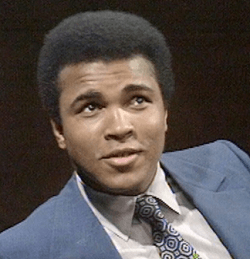
Muhammad Ali, nicknamed "The Greatest", was an American Boxer, and an activist. He is considered one of the significant figures of the 20th century, and he is also given the tag of "Greatest boxer of all time". In 1999, Sports Illustrated named him "Sportsman of the century", and BBC gave him the title of "Sports Personality of the century". He belongs to Louisville, Kentucky, and he started his boxing career at the age of 12. He turned into a professional boxer at the age of 18 when he won a gold medal at the 1960 Summer Olympics in the Light heavyweight category. He changed his religion from Christian to Muslim in 1961. He took the title of world heavyweight championship from Sony Liston at the age of 22 on February 25, 1964. In the same year, he changed his name to Muhammad Ali, as he renounced Cassius Clay as a slave name. In 1966 he was offered a chance to join the military, but he declined as he believed that this goes against his religious beliefs and he was also against the Vietnam War. Due to this evasion, he was stripped of his boxing titles, later his conviction was overturned in 1971, but due to this event, he lost his four years of peak performance as an athlete. His opposition to Vietnam War made him an icon in the larger counter-culture generation. He was also the face of African-Americans who were facing racism. He supported the civil right movement throughout his career. When he got converted to Muslim, he was initially linked to Elijah Muhammad's Nation of Islam(NOI), but later he started adhering to Sunni Islam, and supported racial integration following the footsteps of his mentor Malcolm X. He was part of several historic boxing matches which include, his Fight of the century which he fought against Joe Frazier (the biggest boxing event until then), his fights with Sony Liston(they used to be highly publicized), The rumble in the jungle which he fought against George Foreman, etc. Mostly boxers do not indulge with the media and they let their managers do the talking but Ali thrived in the spotlight. His persona was unmatchable and he was considered provocative. He was also known for trash-talking. His confidence was very high, as he would often predict, which round he would knock out a boxer. I am the greatest(1963) and The Adventures of Ali and His Gang vs. Mr. Tooth Decay(1976), were his two studio albums, which helped him attain success as a spoken word artist. Both albums were nominated for Grammys. Ali took retirement from boxing in 1981, shifting his focus to activism, religion, and philanthropy. He also released two autobiographies, in which he featured as an actor and writer. 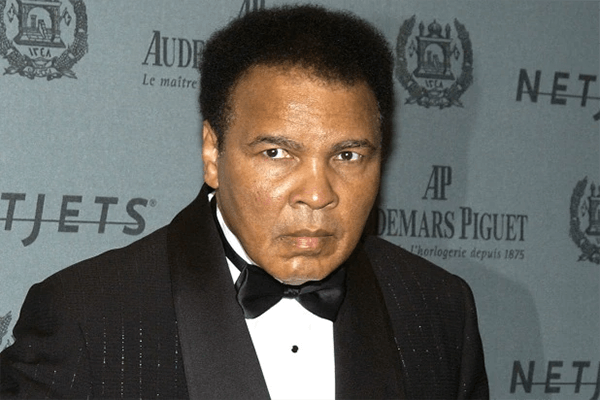
In 1984, he was diagnosed with Parkinson's syndrome, and many reports say it was due to boxing-related injuries. He was an active public figure, but as his condition got worse he made fewer public appearances and was cared for by his family. Early LifeHe was born in Louisville, Kentucky on January 17, 1942. His birth name was Cassius Marcellus Clay Jr. He has one sibling who was named after his father, Cassius Marcellus Clay Sr. His mother was a domestic helper and his father was a billboard painter. His father was a Methodist but he allowed Odessa, his mother, to bring both Cassius Sr and Cassius Jr as Baptists. His brother also changed his name to Rahman Ali. Cassius Jr. went to Central High school in Louisville. He faced difficulties in reading and writing due to his dyslexic condition. Ali faced a lot of racial discrimination while growing up. His mother recalls an event when he was denied water from the store because of his color. This really affected him. The Murder of Emmett Till in 1955 also had an impact on him. He told his daughter Hana once "Nothing would ever shake me up (more) than the story of Emmett Till." When he heard about the news, he along with his friends vandalized a local rail yard. Amateur CareerHis first coach was Joe. E Martin was a police officer, who encountered Ali fuming over a thief's having taken his bicycle. He directed Ali towards boxing. When the officer caught him, he said that he was going to whup the thief, to which the officer replied "you need to learn how to box first". Initially, he declined E Martin's offer, but after watching amateur boxer matches on the television program "tomorrow's champions", he got interested. His first trainer was Fred Stoner, Ali said that he was the one who gave him real training and molded his style, stamina, and system. During the end of his amateur career, he was trained by boxing cutman Chuck Bodak. His first match was against Ronnie O' Keefe in 1954, in which he won by split decision. He had six Kentucky Golden Gloves titles and two national Golden Gloves titles. And he also has a prestigious light heavyweight gold medal in the 1960 summer Olympics. Muhammad Ali mentioned that, after he came home from Rome, he threw his gold medal in the Ohio river and fought with a gang because he wasn't served at a hotel due to his color. Later it was denied by his friends. Professional careerEarly career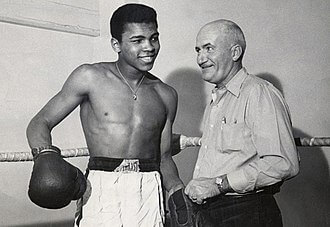
He made his debut on October 29, 1960, where he won a six-round decision over Tunny Hunsaker, and he remained undefeated till 1963 with a score of 19-0. Out of those 19, he had 15 knockouts. Ali also defeated his former trainer Archie Moore. His fight with Doug Jones on March 13, 1963, is considered to be one of the toughest matches during this stretch. He used to belittle his opponents and vaunt their abilities. He was famous for his trash talk and he was inspired by Gorgeous George Wagner. He call Jones an "Ugly little man" and Cooper a "bum", and he also said that he was embarrassed to fight with Alex Miteff, and he said Madison Square Garden was too small for him. George Wagner said to him that if he praise himself in front of the media, the good paying audience would be attracted to him and would pay more either to watch him win or to watch him lose. He took his advice and turned himself into a "big-mouth and a bragger." Moore made him do chores like washing dishes and sweeping, which Ali refused to do and left his camp. In 1960 he hired Angelo Dundee as his trainer. World Heavyweight ChampionFight against Liston: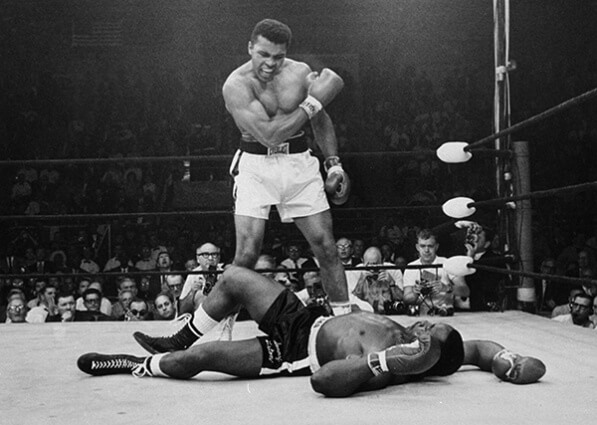
Ali challenged Liston in 1964 for the world heavyweight title. Liston was considered one of the greatest of his era and Ali was an underdog. In the match, Liston submitted in the sixth round and Ali became the new champion. And after this shocking match, he gave another shock to the world by accepting the Nation of Islam. He was given the name Muhammad Ali by his spiritual mentor, Elijah Muhammad. After Liston, he dominated the boxing ring for the next three years. In 1965, he again defeated Liston, and that too in the first round with a knockout. During his fight with Cleveland Will, he landed 100 punches, scored four knockdowns, and was only hit three times over the course of three rounds. Draft ResistanceDuring the Vietnam war, he refused to join Military services because it was against his religious beliefs. He said, "Unless you have a very good reason to kill, war is wrong." Many Americans condemned his decision. He was called a hypocrite by many because he was against the Vietnam war but he would be willing to fight for Islam and would not hesitate from taking part in the Islamic holy war. Due to this decision, he was banned from fighting for three and a half years. He was also sentenced to prison for not accepting induction into the U.S. armed forces. He never went to jail though, and after four years, his conviction was overturned. As the world entered the 1960s, Ali's voice started growing more. He supported the civil right movement. Ali returned to boxing in October 1970. But he was not as powerful as he was in the 60s. The legs with which he used to dance for 15 rounds, no longer carried him as swiftly as they used to. During his absence in the ring, Joe Frazier became the new heavyweight champion. He challenged Joe on March 8, 1971. In the fight which is famously known as the "Fight of the century", Frazier won with a unanimous 15-round decision. After losing to Frazier, he won 10 fights in a row, out of which 8 were against world-class fighters. In 1973, he was fighting against a little known fighter Ken Norton. Ken broke his Jaw. Ken won the match with a unanimous twelve-round decision. Though Ali defeated Norton in a rematch. After that, he challenged Frazier for a rematch, and he won that match with a unanimous 12-round decision. His second bout against Frazier in the rematch was considered his best performance after his exile from boxing. Rumble in the JungleIn the same year, Frazier was dethroned by George Foreman and became the new heavyweight champion. In 1974 Ali challenged George Foreman. He called this bout "Rumble in the Jungle." Bout took place in Zaire. Zaire had a lot of expectations from him, and he did his part and fulfilled their expectations by knocking George Foreman in the Eighth round and taking the heavyweight title back. To win this match, he used the strategy of Archie Moore, Moore called that strategy "The Turtle" and Ali chose to call it "Rope-A-Dope." Earlier he used to move across the ring but in this strategy, he fought for an extended period of time leaning back into the ropes, which helped him avoid some heavy blows from Foreman. Third Fight against Joe Frazier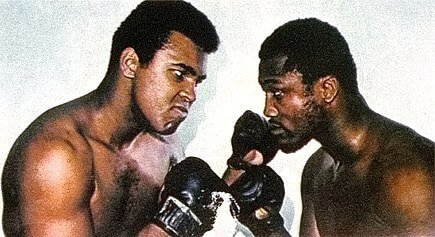
This fight took place in the Philippines, which is 6 miles outside Manila. This is widely known as "Thrilla in Manilla." It is considered to be the greatest prize fight of all time. This was brutal, it went to 14 rounds after which Ali was declared victor when Joe's corner called for a halt. Later CareerLeon Spinks was a novice boxer who had one Olympic gold medal to his name. He defeated Ali in 1978 and took the heavyweight title from him. He couldn't keep it with him for long, Ali took it back after seven months. After winning back the title he announced his retirement from the ring. Fight against Larry Holmes:The only time Ali lost by the stoppage of the match was against Larry Holmes. It was an ill-advised comeback. Larry Holmes was called "The Easton Assassin." The referee had to stop the match in the 10th round. Sylvester Stallone was watching the match live and he says that it was like watching the autopsy one a man who is still alive. It is believed that this fight may have contributed to his Parkinson's syndrome. In later years there was a decline in the physical health of Ali. He evolved religiously over a period of time. He turned into an orthodox Muslim in the 1970s and started reading Quran seriously. ActingDuring his exile from boxing, he starred in a short-lived 1969 Broadway musical, Buck white. He also did a documentary film Black Rodeo in which he rode a horse and a bull. His autobiography "The Greatest: My Own Story", was published in 1975 and it was adapted into a film "The Greatest" in which Ali enacted himself. Personal Life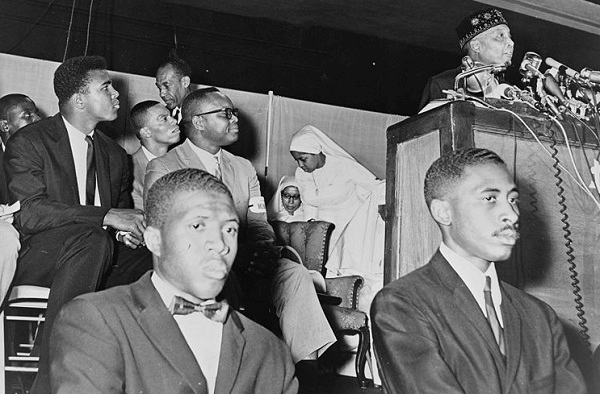
He was married four times and had seven daughters and two sons. His first wife was a cocktail waitress, Sonji Roi. This marriage didn't work because Sonji refused to accept the Nation of Islam. He married Belinda Boyd in 1967, she turned into the Nation of Islam and changed her name to Khalilah Ali. At the age of 32, Ali was in an extramarital affair with 16-year-old Wanda Bolton. Ali got married to Wanda in an Islamic ceremony, and she changed her name to Aaisha. He was again in an extramarital affair with Patricia Harvell. His second marriage ended due to his repeated infidelity, and in 1977 he got married to Veronica Porche. But this marriage ended too due to his infidelity. His last marriage was with Lonnie Williams. Ali was chosen to light the Olympic flame in 1996. The outpouring of goodwill that accompanied his appearance confirmed his status as the most-beloved athlete in the world. Conclusion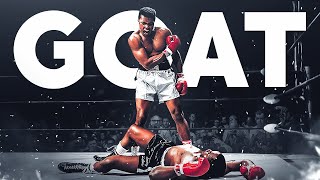
Ali's place as the World's greatest boxer of all time is secured. It's been six years since he died, but still, his face is one of the most recognizable faces in history. He gave many quotes to live by, his most famous quote is, "I hated every minute of training, but I said, 'Don't quit. Suffer now and live the rest of your life as a champion." We can learn a lot from him, he had a warm heart and he had great passion for boxing.
Next TopicSonia Sotomayor
|
 For Videos Join Our Youtube Channel: Join Now
For Videos Join Our Youtube Channel: Join Now
Feedback
- Send your Feedback to [email protected]
Help Others, Please Share










